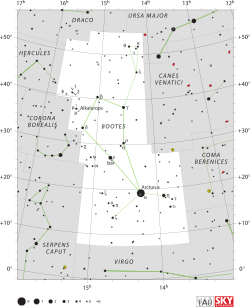梗河一
| 觀測資料 曆元 J2000 | |
|---|---|
| 星座 | 牧夫座 |
| 星官 | 梗河(氐宿) |
| 赤經 | 14h 44m 59.21746s[1] |
| 赤緯 | +27° 04′ 27.2099″[1] |
| 視星等(V) | 2.70[2] / 5.12[3] |
| 特性 | |
| 光譜分類 | K0 II-III[4] + A2 V[5] |
| U−B 色指數 | +0.73[2] |
| B−V 色指數 | +0.97[2] |
| 天體測定 | |
| 徑向速度 (Rv) | −16.31[6] km/s |
| 自行 (μ) | 赤經:−50.95[1] mas/yr 赤緯:+21.07[1] mas/yr |
| 視差 (π) | 16.10 ± 0.66[1] mas |
| 距離 | 203 ± 8 ly (62 ± 3 pc) |
| 絕對星等 (MV) | −1.61[7] |
| 詳細資料 | |
| A | |
| 質量 | 4.6[8] M☉ |
| 半徑 | 33[6] R☉ |
| 表面重力 (log g) | 2.2[6] |
| 亮度 | 501[6] L☉ |
| 溫度 | 4,550[6] K |
| 金屬量 | –0.13[6] |
| 自轉速度 (v sin i) | 10.9[6] km/s |
| 年齡 | 37.4 ± 4.2[9] Myr |
| B | |
| 自轉速度 (v sin i) | 123[10] km/s |
| 其他命名 | |
| 參考資料庫 | |
| SIMBAD | 資料 |
梗河一(ε Boötis,縮寫Epsilon Boo或ε Boo),官方的正式名稱為 Izar /ˈaɪzɑːr/[13],是在北天星座牧夫座中的一顆聯星。這顆恆星可以直接以裸眼看見,但對76 mm(3.0英寸)的望遠鏡要解析出是聯星,卻很有挑戰性,而通常需要口徑更大的望遠鏡[14]。
命名
[編輯]它的傳統名稱是Izar、Mirak和Mizar,還有奧圖·史都華命名的Pulcherrima /pəlˈkɛrɪmə/[15];Izar、Mirak和Mizar源自阿拉伯的 إزار 』izār 'veil' 和المراق al-maraqq 'the loins';'Pulcherrima' 是拉丁文的 '可愛'[16]。在2016年,國際天文學聯合會組織的IAU恆星名稱工作組(WGSN)[17]開始對恆星的名稱進行編目和標準化。WGSN於2016年8月21日核定梗河一的名稱為Izar,現在已經輸入IAU的星名目錄中[13]。
在Calendarium of Al Achsasi Al Mouakket這本古老的恆星目錄中,這顆恆星被標誌為Mintek al Aoua (منطقة العوّاء - minṭáqa al awwa);翻譯成拉丁文是Cingulum Latratoris,意思是博克的腰帶[18]。
在漢語,梗河一(Gěng Hé yī)的意思是氐宿中的星官梗河的第一顆星。這個星官共有三顆恆星,另外兩顆是牧夫座σ和牧夫座ρ[19][20]。
性質
[編輯]
梗河一由兩顆恆星組成,其角距離為2.852 ± 0.014 弧秒,方位角342.°9 ± 0.°3[21]。較亮的恆星(A)視星等為2.70等,[2],在夜晚很容易以裸眼看見。較暗的那一顆(B)視星等為5.12等[3],理論上應該也可以用裸眼看見。依巴谷天體測量衛星[22][23]測量其視差,得到它與地球的距離大約是203光年(62秒差距)[1]。這意味著這兩顆星之間的投影分離度大約是185天文單位,互繞的軌道周期至少是1,000年[16]。
較亮的梗河一A光譜類型為K0 II-III[4],意味著它是一顆相當年長的恆星,在恆星演化的路途上已經耗盡了核心的氫燃料。有著超過太陽4倍的質量[8],它的半徑已經擴展至33倍太陽半徑,而估計其光度是太陽亮度的501倍[6],在表面有效溫度4,550K向外輻射的能量[6]使它呈現出K型恆星的橙色[24]。
伴星的光譜類型為A2 V[5],所以它是一顆核心仍在進行核融合,將氫融合成氦的主序星。這顆恆星自轉的非常快,投影的自轉速度是123 km s−1[10],當質量較低的主序星在其演化過程中達到目前生命的關鍵點時,質量較大的恆星會失去較多的質量成為行星狀星雲,殘留的核心則演化成為白矮星。這對組合基本上將改變角色:原本明亮的恆星將成為黯淡的侏儒,而較小的伴星將成為明亮的巨星[16]。
在文化上
[編輯]參見:科幻中的梗河一
在1973年,蘇格蘭天文學家和科幻小說作家鄧肯·魯南聲稱已經可以解釋由兩位挪威物理學家的說法[25]。根據他的理論,被稱為黑騎士繞著地球已有10,000年歷史的繞極衛星是由梗河一的一顆行星上的居民送過來的[26];時代雜誌曾經報導過個個故事[27]。魯南後來撤回了他對梗河一的理論,並提出了反對這理論的證據,並澄清之前為何會提出這樣的理論,以及之後為何懷疑而撤銷他之前的理論[28]。
參考資料
[編輯]- ^ 1.0 1.1 1.2 1.3 1.4 1.5 van Leeuwen, F. Validation of the new Hipparcos reduction. Astronomy and Astrophysics. November 2007, 474 (2): 653–664. Bibcode:2007A&A...474..653V. arXiv:0708.1752
 . doi:10.1051/0004-6361:20078357.
. doi:10.1051/0004-6361:20078357.
- ^ 2.0 2.1 2.2 2.3 Johnson, H. L.; et al. UBVRIJKL photometry of the bright stars. Communications of the Lunar and Planetary Laboratory. 1966, 4 (99). Bibcode:1966CoLPL...4...99J.
- ^ 3.0 3.1 3.2 HR 5506 -- Star in double system, SIMBAD (Centre de Données astronomiques de Strasbourg), [2012-01-09], (原始內容存檔於2016-04-14)
- ^ 4.0 4.1 Luck, R. Earle; Wepfer, Gordon G., Chemical Abundances for F and G Luminosity Class II Stars, Astronomical Journal, November 1995, 110: 2425, Bibcode:1995AJ....110.2425L, doi:10.1086/117702
- ^ 5.0 5.1 Cowley, A.; et al, A study of the bright A stars. I. A catalogue of spectral classifications, Astronomical Journal, April 1969, 74: 375–406, Bibcode:1969AJ.....74..375C, doi:10.1086/110819
- ^ 6.0 6.1 6.2 6.3 6.4 6.5 6.6 6.7 6.8 Massarotti, Alessandro; et al, Rotational and Radial Velocities for a Sample of 761 Hipparcos Giants and the Role of Binarity, The Astronomical Journal, January 2008, 135 (1): 209–231, Bibcode:2008AJ....135..209M, doi:10.1088/0004-6256/135/1/209
- ^ Anderson, E.; Francis, Ch., XHIP: An extended hipparcos compilation, Astronomy Letters, 2012, 38 (5): 331, Bibcode:2012AstL...38..331A, arXiv:1108.4971
 , doi:10.1134/S1063773712050015.
, doi:10.1134/S1063773712050015.
- ^ 8.0 8.1 Gondoin, P., Evolution of X-ray activity and rotation on G-K giants, Astronomy and Astrophysics, December 1999, 352: 217–227, Bibcode:1999A&A...352..217G
- ^ Tetzlaff, N.; Neuhäuser, R.; Hohle, M. M., A catalogue of young runaway Hipparcos stars within 3 kpc from the Sun, Monthly Notices of the Royal Astronomical Society, January 2011, 410 (1): 190–200, Bibcode:2011MNRAS.410..190T, arXiv:1007.4883
 , doi:10.1111/j.1365-2966.2010.17434.x
, doi:10.1111/j.1365-2966.2010.17434.x
- ^ 10.0 10.1 Royer, F.; et al, Rotational velocities of A-type stars in the northern hemisphere. II. Measurement of v sin i, Astronomy and Astrophysics, October 2002, 393: 897–911, Bibcode:2002A&A...393..897R, arXiv:astro-ph/0205255
 , doi:10.1051/0004-6361:20020943
, doi:10.1051/0004-6361:20020943
- ^ CCDM J14449+2704AB, SIMBAD (Centre de Données astronomiques de Strasbourg), [2012-01-09], (原始內容存檔於2019-12-11)
- ^ HR 5505 -- Star in double system, SIMBAD (Centre de Données astronomiques de Strasbourg), [2012-01-09], (原始內容存檔於2016-04-14)
- ^ 13.0 13.1 IAU Catalog of Star Names. [28 July 2016]. (原始內容存檔於2018-07-07).
- ^ Monks, Neale, Go-To Telescopes Under Suburban Skies, Patrick Moore's Practical Astronomy Series, Springer: 110, 2010 [2019-05-18], ISBN 1-4419-6850-4, (原始內容存檔於2019-08-23)
- ^ Norton's Star Atlas, publ. Gall & Inglis, Edinburgh, 2nd Ed., 1959
- ^ 16.0 16.1 16.2 Kaler, James B., Izar, Stars (University of Illinois), [2012-01-09], (原始內容存檔於2019-03-26)
- ^ IAU working group on star names (WGSN). [22 May 2016]. (原始內容存檔於2019-03-30).
- ^ Knobel, E. B., Al Achsasi Al Mouakket, on a catalogue of stars in the Calendarium of Mohammad Al Achsasi Al Mouakket, Monthly Notices of the Royal Astronomical Society, June 1895, 55: 429, Bibcode:1895MNRAS..55..429K, doi:10.1093/mnras/55.8.429
- ^ (中文) 中國星座神話, written by 陳久金. Published by 台灣書房出版有限公司, 2005, ISBN 978-986-7332-25-7.
- ^ (中文) 香港太空館 - 研究資源 - 亮星中英對照表 網際網路檔案館的存檔,存檔日期January 29, 2011,., Hong Kong Space Museum. Accessed on line November 23, 2010.
- ^ Prieur, J.-L.; et al, Speckle observations with PISCO in Merate - V. Astrometric measurements of visual binaries in 2006, Monthly Notices of the Royal Astronomical Society, June 2008, 387 (2): 772–782, Bibcode:2008MNRAS.387..772P, doi:10.1111/j.1365-2966.2008.13265.x
- ^ Perryman, M. A. C.; Lindegren, L.; Kovalevsky, J.; et al, The Hipparcos Catalogue, Astronomy and Astrophysics, July 1997, 323: L49–L52, Bibcode:1997A&A...323L..49P
- ^ Perryman, Michael, The Making of History's Greatest Star Map, Heidelberg: Springer-Verlag, 2010, doi:10.1007/978-3-642-11602-5
- ^ The Colour of Stars, Australia Telescope, Outreach and Education (Commonwealth Scientific and Industrial Research Organisation), December 21, 2004 [2012-01-16], (原始內容存檔於2012-03-10)
- ^ Holm, Sverre, The Five Most Likely Explanations for Long Delayed Echoes, March 16, 2004 [2009-09-01], (原始內容存檔於2009-11-13)
- ^ Lunan, Duncan. Spaceprobe from Epsilon Bootes. Spaceflight (London, England: British Interplanetary Society). April 1973, 15 (4).
- ^ Message from a Star, Time, April 9, 1973 [2009-08-27], (原始內容存檔於2010-04-29)
- ^ Lunan, Duncan, Epsilon Boötis Revisited, Analog Science Fiction and Fact, March 1998, 118 (3)

